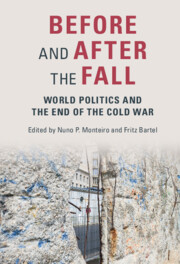Book contents
- Before and After the Fall
- Before and After the Fall
- Copyright page
- Dedication
- Epigraph
- Contents
- Figures
- Tables
- Contributors
- Preface
- Introduction
- Part I Sources of Continuity and Change
- Part II Continuity and Change Across the 1989/1991 Divide
- 6 The Nuclear Age
- 7 Legitimating Primacy After the Cold War
- 8 Russia’s Rejection of Liberal Politics
- 9 Continuity and Change in Russian Grand Strategy
- 10 The Stickiness of Strategy
- 11 Avoiding the Limelight
- Part III Toward a New World Order?
- Index
8 - Russia’s Rejection of Liberal Politics
Marxist Critiques of Trotsky and Fukuyama
from Part II - Continuity and Change Across the 1989/1991 Divide
Published online by Cambridge University Press: 02 December 2021
- Before and After the Fall
- Before and After the Fall
- Copyright page
- Dedication
- Epigraph
- Contents
- Figures
- Tables
- Contributors
- Preface
- Introduction
- Part I Sources of Continuity and Change
- Part II Continuity and Change Across the 1989/1991 Divide
- 6 The Nuclear Age
- 7 Legitimating Primacy After the Cold War
- 8 Russia’s Rejection of Liberal Politics
- 9 Continuity and Change in Russian Grand Strategy
- 10 The Stickiness of Strategy
- 11 Avoiding the Limelight
- Part III Toward a New World Order?
- Index
Summary
The Soviet Union’s official ideology, Marxism-Leninism, was universal, aspiring to explain all humanity’s past and future. It claimed to be a science, applicable to social relations, economics, and international politics. Culture, religion, and traditional social structures, Marxism-Leninism taught, would be swept away by economic and social change. This was true in Soviet domestic politics, where "feudal" practices such as religion and patriarchy were supposed to be replaced by the Party and the State. It was also true, experts in Marxism-Leninism taught, in international politics, where class not culture would determine the future. In the 1970s, however, Soviet experts, analysts, and officials began to question the supposed irrelevance of culture, religion, and tradition. In foreign policy, culture seemed of enduring relevance in explaining how countries in Asia and Africa interacted with the Soviet Union. In domestic politics, "traditional structures" in regions like Central Asia and the Caucasus seemed to persist generations after Soviet power had been established. This paper traces Soviet and later Russian belief in the importance of cultural, ethnic, national, and civilizational factors in politics from the 1970s to the present via several influential intellectuals who drove the shift. It connects the rising Soviet belief in the importance of clashing civilizations to declining faith in Russia in universalistic politics in general. In the West, the Cold War’s end was associated with Francis Fukuyama’s end-of-history thesis. In Russia, the Cold War’s demise corresponded with a rejection of Marxist-Leninist universalism and a new emphasis on cultural and civilizational difference.
Keywords
- Type
- Chapter
- Information
- Before and After the FallWorld Politics and the End of the Cold War, pp. 151 - 168Publisher: Cambridge University PressPrint publication year: 2021

